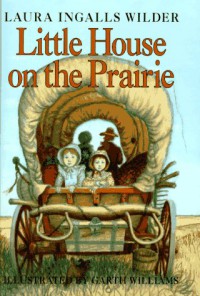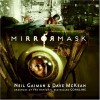Currently reading
MirrorMask (children's edition)
The Unreal and the Real: Selected Stories, Volume One: Where on Earth
Betsy and Tacy Go Downtown
The Picture of Dorian Gray
Riders of the Purple Sage
Vampires, Zombies, & Wanton Souls
 Oh my! What happened to the innocence of [b:Little House in the Big Woods|8337|Little House in the Big Woods (Little House, #1)|Laura Ingalls Wilder|http://d202m5krfqbpi5.cloudfront.net/books/1266449708s/8337.jpg|1200805]? Pioneer life happened, that's what. Wilder's story now travels some controversial ground, particularly related to the pioneer settling of native lands. Here's an uncomfortable sample of settler ideology:
Oh my! What happened to the innocence of [b:Little House in the Big Woods|8337|Little House in the Big Woods (Little House, #1)|Laura Ingalls Wilder|http://d202m5krfqbpi5.cloudfront.net/books/1266449708s/8337.jpg|1200805]? Pioneer life happened, that's what. Wilder's story now travels some controversial ground, particularly related to the pioneer settling of native lands. Here's an uncomfortable sample of settler ideology:[Mrs. Scott] said she hoped to goodness they would have no trouble with Indians. Mr. Scott had heard rumors of trouble. She said, "Land knows, they'd never do anything with this country themselves. All they do is roam around over it like wild animals. Treaties or no treaties, the land belongs to folks that'll farm it. That's only common sense and justice."
She did not know why the government made treaties with Indians. The only good Indian was a dead Indian. The very thought of Indians made her blood run cold. She said, "I can't forget the Minnesota massacre."
Lord have mercy! The "Minnesota massacre" Mrs. Scott's speaking of happened as part of the Dakota War/Sioux Uprising of 1862. Angered by mounting treaty violations by the U.S. government, the Dakota began attacking Minnesota River Valley settlements to drive out the settlers. Estimates are that as many as 800 settlers were killed. The U.S. Army got involved, capturing and jailing more than one thousand Dakota in Minnesota jails. In the end, 38 Dakota were hanged on December 26, 1862, which is the largest one-day execution in U.S. history. The remaing Dakota were then expelled from Minnesota, and Congress abolished their reservations.
It's this background that explains the high level of distrust between the Ingalls/Scotts/Edwards and the native populations in Little House on the Prairie. There's also tension among settlers shown by an encounter between Pa and Laura:
"Will the government make these Indians go west?"
"Yes," Pa said. "When white settlers come into a country, the Indians have to move on. The government is going to move these Indians farther west, any time now. That's why we're here, Laura. White people are going to settle all this country, and we get the best land because we get here first and take our pick. Now do you understand?"
"Yes, Pa," Laura said. "But, Pa, I thought this was Indian Territory. Won't it make the Indians mad to have to--"
"No more questions, Laura," Pa said, firmly. Go to sleep."
Talk about stifling debate! Pa'll have nothing of a child questioning his settler logic. Pa's, Ma's, and the Scotts' ideas about settler rights sound so familiar in today's arguments about Israeli settlements in the West Bank. This same logic was used to defend apartheid policies in southern Africa. Humbling, to say the least.
As much as Pa and Ma's decision to leave the Big Woods and settle on native lands frustrates me and runs counter to my sense of justice and fairness, I'm glad LIW shared their story with the world. It's good to remember accounts of the broken promises and violent confrontations between whites and native people so we can do better in the future. Heck, my family lives only 85 miles from Mankato, Minnesota where the 38 Dakota were hanged. And I grew up in Oklahoma where as elementary school students we celebrated Pioneer Day every September with re-enactments of the 1889 Land Run. LIW's family history resonates powerfully with me, and will provide material for meaningful discussions as our almost-three-year-old Sigourney and three-month-old Kieran get older. The Little House series really is historical fiction at its best.








